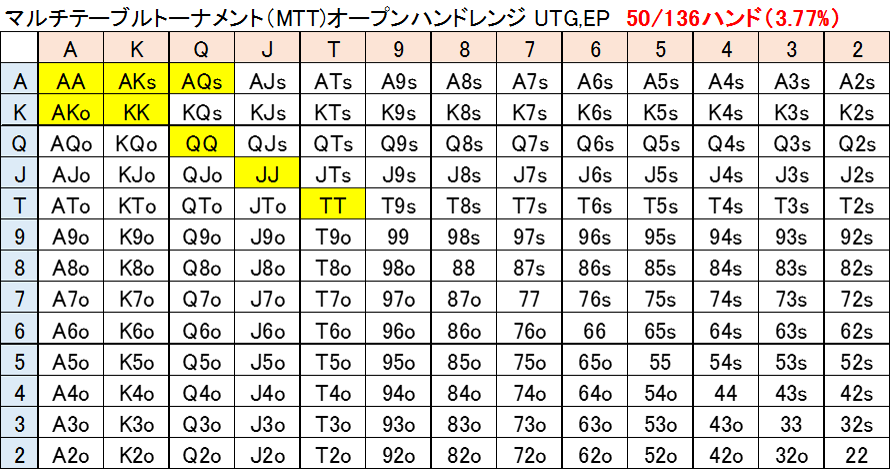-
Thoughts after a few more days
- I’m starting to be able to predict the strength of the opponent’s hand by observing their bets
- (Maybe it’s because I’m in the beginner’s room, so it’s easy)
- I’m starting to be able to predict the strength of the opponent’s hand by observing their bets
-
Thoughts after playing for a few days on the WSOP app
- It seems important to have a thorough awareness of randomness
- For example, even if good cards come out after folding, I think it’s different to think “I made a mistake”
- I should evaluate my actions based on whether I was able to maximize the expected value
- Highly Random Things
- If I feel like I’m being influenced by the opponent’s raises, it seems better to give up even if I was planning to raise myself
- This may not apply universally when playing against advanced players
- Even if I try to evaluate probabilities on the spot, counting the number of possible favorable outcomes is the limit
- Like having only 2-3 good outcomes or having 5 possible outcomes
- It’s clear that this is wrong, but I can’t think beyond that
- It seems important to have a thorough awareness of randomness
https://www.youtube.com/watch?v=shRfL5Uux2E
rickshinmi lecture
-
Hand
-
Position
- Being in a later position is advantageous
-
Number of players
- Fewer players is advantageous
-
Hand chart
- As a premise, you should actively fold bad cards
- I didn’t have much of this sense (blu3mo)
- How to use:
- Use it when you have your own hand
- It can also be used to read the opponent’s hand
- I see (blu3mo)(blu3mo)

- I see (blu3mo)(blu3mo)
- As a premise, you should actively fold bad cards
-
I’m not sure if A+ and the others are really that valuable
- A also has a role as a kicker, so maybe that’s why it’s highlighted in yellow (blu3mo)
-
Pre-flop
- If you’re not in the big blind, you should choose either ①raise and participate or ②fold
- Checking is generally not recommended (unless there has already been a raise) (blu3mo)(blu3mo)(blu3mo)
- There are various theories, but generally a raise of about 3BB is appropriate
- It’s difficult to make the right move when facing a big raise from someone after raising pre-flop
- If you’re not in the big blind, you should choose either ①raise and participate or ②fold
-
After the flop, first round
- You should try to predict the opponent’s hand to some extent
- When it’s the original raiser (the person who raised pre-flop)
- It’s important to mix up your patterns so that they can’t read your hand
- When it’s not the original raiser: it’s better to avoid a donk bet
- It’s not good to raise before the person who raised pre-flop (the original raiser) acts
- It’s important to know how the original raiser will act in this round, so it’s not good to raise before obtaining that information
-
Subsequent rounds
- Consider whether you are winning or not
- When you are almost certain to be winning
- => Value bet
- When there is a possibility of winning (like being able to make a flush)
- => Bet strongly
- The goal is to eliminate the opponent’s possibilities
- This is very important (blu3mo)(blu3mo)
- Since there has already been a raise at this point, you can expect to make a decent profit (blu3mo)
- To eliminate the opponent’s possibilities of a flush, etc., you should bet a large amount (around the size of the pot)
-
What’s important is to bet based on the amount in the pot
- A “bet n% of the pot” move always has the same meaning in terms of expected value
-
- When you are almost certain to be losing
- => Bluff bet
- Bluffing should only be done when you have some hope
-
Things to avoid
- Making small raises
- It doesn’t serve as value or bluff- Long-term Strategy
- Always be aware of the chip count in BB units.
- Start feeling the urgency when the stack is around 20BB, and consider folding or making an all-in move.
- Avoid gradually losing chips.
- All-in move.
- Even if the stack is reduced to around 5BB, it doesn’t have much power.
- It’s better to use the all-in move while still having significant power.
- Making small raises
-
I don’t know any rules.
-
It seems interesting and I’m curious.
-
It relates to Neumann’s game theory (tkgshn).
-
I’m good at it (rickshinmi).
- Let’s play (tkgshn)(tkgshn)(tkgshn).
- Definitely! (I’ve been saying I’ll play for a while without actually doing it) (rickshinmi)(rickshinmi)(rickshinmi)
- Let’s play (tkgshn)(tkgshn)(tkgshn).
-
I roughly understand the rules of Texas Hold’em.
-
It seems important to have the mindset of 60fff7cd79e113000047ebfa in poker.
-
However, constantly calculating probabilities may have its limits, so developing an accurate intuition for probability calculation seems important.
- (rickshinmi) Rough probability calculations sometimes use the rule of two and four, but it would be ideal to rely on intuition.
- https://poker101.jp/beginner/the-rule-of-two-and-four/
-
I want to try it at school after summer vacation.
- I want to try it (aka).

